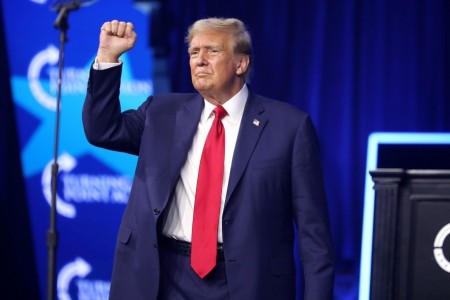ARTICLE AD BOX

At the recent Bitcoin conference in Nashville, the former president made a bold promise: if elected, he would make the U.S. the "crypto capital of the planet" and usher in a "Bitcoin superpower." The crowd erupted in cheers, but beyond the hype, what does this really mean for the future of Bitcoin?
Trump's embrace of crypto is undoubtedly a political maneuver. His campaign has already raked in millions in cryptocurrency donations, and his Nashville appearance likely generated a further windfall. The price of Bitcoin surged following his speech, reaching its highest point in weeks, before settling back down.
Can He Keep His Promises?
But are Trump's promises realistic? He has pledged to keep all Bitcoin currently held or acquired by the U.S. government, an interesting proposition given the complexities of confiscated cryptocurrency. Holding onto such assets could send mixed messages to victims of crypto crime, as evidenced by the outcry from Chinese fraud victims who sought the return of Bitcoin seized by London police.
Moreover, the idea of the government stockpiling Bitcoin runs counter to the cryptocurrency's decentralized origins. Bitcoin was designed to operate independently from central authorities, yet its current landscape already sees a significant concentration of Bitcoin held by powerful mining pools. Adding substantial government holdings could further tip the scales, potentially undermining the very principles that initially drew people to Bitcoin.
Loose Regulations
On the regulatory front, Trump has promised a "crypto-friendly" environment, taking aim at current regulations he deems overly restrictive. This may be welcomed by the crypto community, who have long sought clarity and support from government institutions. Trump has even gone so far as to criticize the SEC chair, Gary Gensler, and threaten to replace him with someone more supportive of the industry.
However, the specifics of Trump's proposed regulatory changes remain vague. While he has promised "crypto-friendly" regulations written by people who "love" the industry, questions linger about how this will be implemented. Recent SEC investigations into crypto fraudsters, including the sentencing of FTX founder Sam Bankman-Fried to 25 years in prison, highlight the need for a balanced approach that protects investors while encouraging innovation.
Vision Is Still Murky
Ultimately, the impact of Trump's crypto agenda on Bitcoin's price remains unclear. While his rhetoric may cause temporary fluctuations, sustained price growth requires consistent and concrete policies. Other factors, such as government sales of confiscated Bitcoin and the ongoing concerns about Bitcoin's environmental footprint, will also play a significant role.
The future of Bitcoin is intertwined with global political landscapes, and the U.S. will undoubtedly play a key role. Trump's bold pronouncements may be captivating, but the real test will be whether his actions align with his words and create a truly sustainable future for Bitcoin.
.png)
 3 months ago
3
3 months ago
3








 English (US)
English (US)